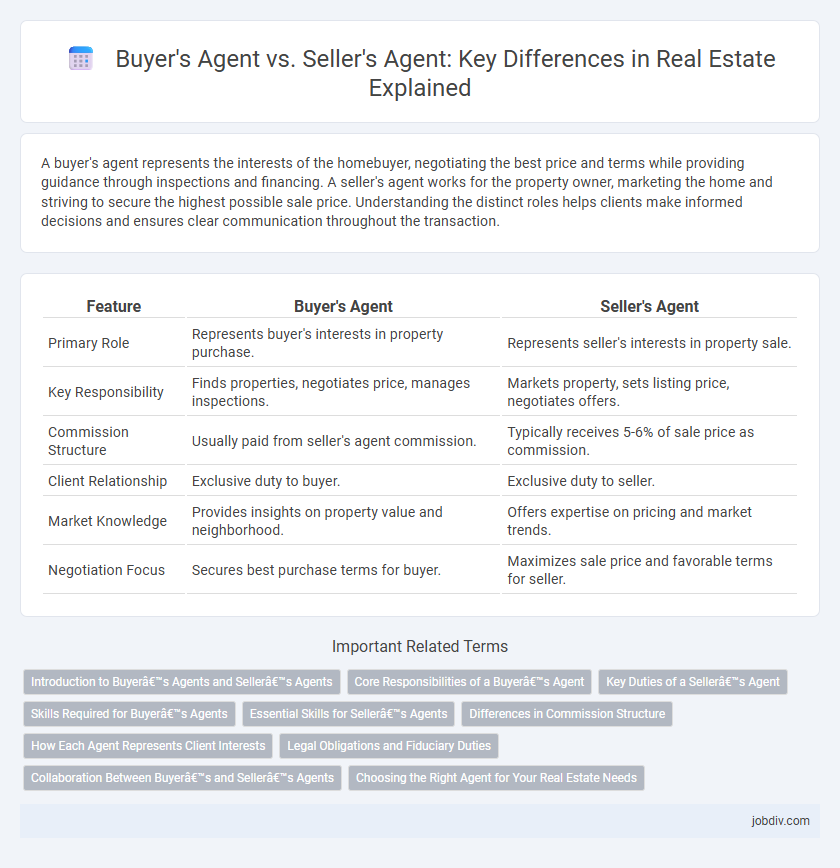A buyer's agent represents the interests of the homebuyer, negotiating the best price and terms while providing guidance through inspections and financing. A seller's agent works for the property owner, marketing the home and striving to secure the highest possible sale price. Understanding the distinct roles helps clients make informed decisions and ensures clear communication throughout the transaction.
Table of Comparison
| Feature | Buyer's Agent | Seller's Agent |
|---|---|---|
| Primary Role | Represents buyer's interests in property purchase. | Represents seller's interests in property sale. |
| Key Responsibility | Finds properties, negotiates price, manages inspections. | Markets property, sets listing price, negotiates offers. |
| Commission Structure | Usually paid from seller's agent commission. | Typically receives 5-6% of sale price as commission. |
| Client Relationship | Exclusive duty to buyer. | Exclusive duty to seller. |
| Market Knowledge | Provides insights on property value and neighborhood. | Offers expertise on pricing and market trends. |
| Negotiation Focus | Secures best purchase terms for buyer. | Maximizes sale price and favorable terms for seller. |
Introduction to Buyer’s Agents and Seller’s Agents
Buyer's agents represent homebuyers, focusing on negotiating purchase terms, identifying suitable properties, and protecting the buyer's interests throughout the transaction. Seller's agents, also known as listing agents, work on behalf of property sellers to market the home, attract qualified buyers, and secure the best possible sale price. Understanding the distinct roles helps clients choose the right representation based on whether they are buying or selling real estate.
Core Responsibilities of a Buyer’s Agent
A buyer's agent primarily represents the interests of homebuyers by conducting thorough market research, identifying suitable properties, and negotiating purchase terms to secure the best deal. They coordinate property viewings, provide insights on neighborhood trends, and assist with offer submissions and contract reviews. Their expertise ensures buyers navigate the complex real estate process efficiently while protecting their financial and legal interests.
Key Duties of a Seller’s Agent
A seller's agent primarily focuses on marketing the property, setting the right listing price based on market analysis, and negotiating offers to maximize the seller's profit. They coordinate property showings, handle communication with potential buyers and their agents, and prepare the necessary documentation for the transaction. Their key responsibility is to protect the seller's interests throughout the sale, ensuring a smooth closing process.
Skills Required for Buyer’s Agents
Buyer's agents must possess strong negotiation skills to secure favorable purchase prices and terms, alongside comprehensive market knowledge to identify suitable properties matching clients' needs. Proficiency in contract law and attention to detail ensure buyers understand and comply with legal obligations throughout the transaction. Effective communication skills are essential for managing client expectations and coordinating with sellers, inspectors, and lenders efficiently.
Essential Skills for Seller’s Agents
Seller's agents excel in negotiation skills, market analysis, and property valuation to secure the best offer for their clients. Mastery of marketing strategies, such as listing optimization and targeted advertising, helps seller's agents attract qualified buyers quickly. Strong communication and contract management abilities ensure smooth transactions and protect the seller's interests throughout the sale process.
Differences in Commission Structure
Buyer's agents typically earn a commission based on a percentage of the home's purchase price, which is often shared with the seller's agent and included in the overall transaction costs. Seller's agents usually receive a commission paid directly by the seller, commonly ranging from 5% to 6% of the property's sale price, which is then split between the seller's and buyer's agents. This difference in commission structure influences how agents negotiate and prioritize their clients' interests in real estate transactions.
How Each Agent Represents Client Interests
Buyer's agents prioritize their clients' needs by focusing on finding the best property deals, negotiating purchase terms, and protecting buyers from overpaying or hidden issues. Seller's agents, also known as listing agents, concentrate on marketing the property, attracting qualified buyers, and securing the highest possible sale price for the seller. Both types of agents owe fiduciary duties to their respective clients, ensuring loyalty, confidentiality, and full disclosure throughout the real estate transaction.
Legal Obligations and Fiduciary Duties
Buyer's agents have legal obligations to act in the best interests of the buyer, including confidentiality, loyalty, and full disclosure, while seller's agents owe similar fiduciary duties to the seller. Both agents must maintain honesty, avoid conflicts of interest, and present all material facts related to the property transaction. Understanding these fiduciary responsibilities ensures that each party's rights are protected throughout the real estate process.
Collaboration Between Buyer’s and Seller’s Agents
Collaboration between buyer's agents and seller's agents enhances real estate transactions by facilitating clear communication and efficient negotiation, ensuring both parties' interests are met. Buyer's agents provide insights on market conditions and client preferences, while seller's agents offer detailed property information and pricing strategies. This cooperative dynamic helps accelerate deal closures and creates a smoother buying and selling experience.
Choosing the Right Agent for Your Real Estate Needs
Selecting the right real estate agent depends on your role in the transaction: a buyer's agent exclusively represents your interests, negotiating price and terms to secure the best deal, while a seller's agent focuses on marketing your property and attracting qualified buyers. Understanding the distinct functions of each agent type ensures tailored guidance, whether you aim to purchase or sell, ultimately optimizing your real estate outcome. Evaluating agent experience, market knowledge, and communication skills is critical for aligning with your specific property goals and navigating complex negotiations effectively.
Buyer’s Agent vs Seller’s Agent Infographic

 jobdiv.com
jobdiv.com